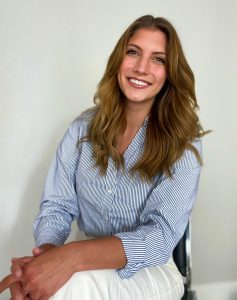Olivia Abram completed the coursework option in the Masters of Arts in English this spring, supervised by Dr. Allison Hargreaves. Her independent research paper was entitled, Settler-as-secondary: Ethics and Politics of a Settler Engagement with Islands of Decolonial Love. Abram came to UBC Okanagan in the fall of 2020 after completing her Bachelors of Secondary Education from the University of Alberta, and a BA equivalent from the University of Saskatchewan. Olivia is set to start her PhD this fall back at the University of Saskatchewan.
We asked Olivia to discuss her experience at UBCO as a master’s student.
Why did you choose to apply to the MA in English program at UBC Okanagan?
My decision to attend UBCO was based mostly on working with Dr. Hargreaves, but the beauty of the Okanagan, the size of the university community, and the option to complete my MA in one year were also contributing factors.
After teaching three years of high school English, I decided I wanted to pursue a Masters—deciding between an M.Ed and an MA was difficult, but my passions for literature, reading approaches, and social justice led me to the English program. My background in Education certainly guides my research interests, but my experiences with the scholars in the field of literary studies has affirmed my decision to stay in English.
Tell us about your independent research paper.
My research seeks to explore ethical or “socially-responsible” reading approaches for settlers engaging with Indigenous texts, specifically those written primarily for Indigenous audiences. Because of the heavy risk of transgression, appropriation, misuse, and erasure, my research hopes to explore the decolonial potential of Indigenous-led interpretive frameworks. My project proposes and models three reading frameworks for Leanne Simpson’s collection of poetry, songs, and stories called Islands of Decolonial Love. My research hopes to demonstrate the power of situating the settler-as-secondary in helping readers acknowledge their complicity, inspire them to trouble facades of settler benevolence, and work toward internal and material decolonization.
How have your professors supported you throughout your degree?
Though the objective of my coursework was to create breadth and depth in the study of literature as a whole, my professors encouraged me to research my interests and apply the theories discussed in class to my specific interests. They were very generous with their time, often going out of their way to suggest texts, provide resources, and meet to discuss how I might extend on coursework to make it more relevant to my research. They were also very supportive of my applications for doctoral studies. My supervisor, Dr. Hargreaves, provided attentive, caring, generous feedback and support throughout my degree and exceeded my high expectations, making my time at UBCO incredible, even in a COVID year.
Where do you hope this degree will lead you?
I will be starting my PhD in English Literature this year, so I’m looking forward to using the skills and knowledge I learned from instructors and mentors at UBCO to deepen and broaden my research in the field of Indigenous Literatures! Eventually, I hope to teach at the post-secondary level, consult for curriculum design, or use my research to work toward more equitable teaching and learning practices.
